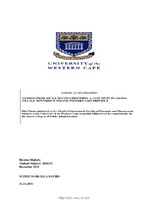| dc.contributor.advisor | Davids, Gregory | |
| dc.contributor.author | Mqikela, Dumisa | |
| dc.date.accessioned | 2022-03-08T07:13:50Z | |
| dc.date.available | 2022-03-08T07:13:50Z | |
| dc.date.issued | 2021 | |
| dc.identifier.uri | http://hdl.handle.net/11394/8836 | |
| dc.description | Masters in Public Administration - MPA | en_US |
| dc.description.abstract | This study investigates problems around provision of social housing with a specific focus in social housing programmes in South Africa. Research is looking at challenges faced by the municipality in making sure housing beneficiaries receive houses of their own. This challenge arises from the ability of government to provide enough and adequate houses to people with housing demand. The government has promised to provide for each citizen a roof over their head however the apparent housing allocation and distribution process has been slow with some parts of the society being excluded from the housing subsidy. Since 1994 after democracy took place, the government has built 1 million houses however this was not enough to secure houses for all, as many individuals are still living in shacks with little or no access to basic services. This paper looks at the challenges and experiences in social housing learnt by housing beneficiaries mainly in the Siyanyanzela Informal Settlement. | en_US |
| dc.language.iso | en | en_US |
| dc.publisher | University of Western Cape | en_US |
| dc.subject | Social housing | en_US |
| dc.subject | Reconstruction & Development Programme | en_US |
| dc.subject | Management information systems | en_US |
| dc.subject | Informal settlements | en_US |
| dc.subject | Service delivery | en_US |
| dc.title | Lessons from social housing provision: A case study in Asanda village township in Strand, Western Cape province | en_US |
| dc.rights.holder | University of Western Cape | en_US |

